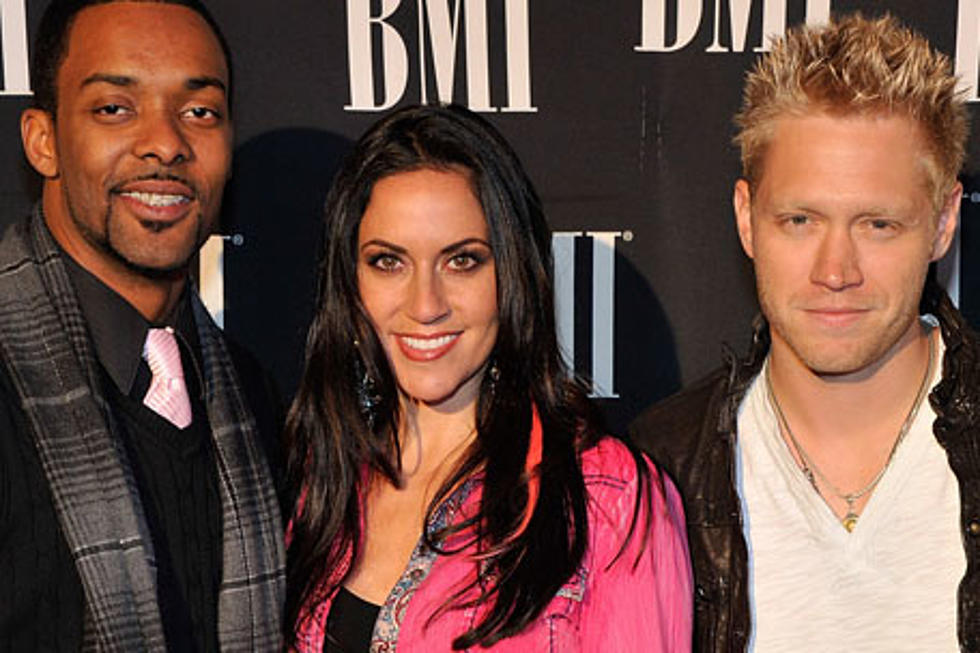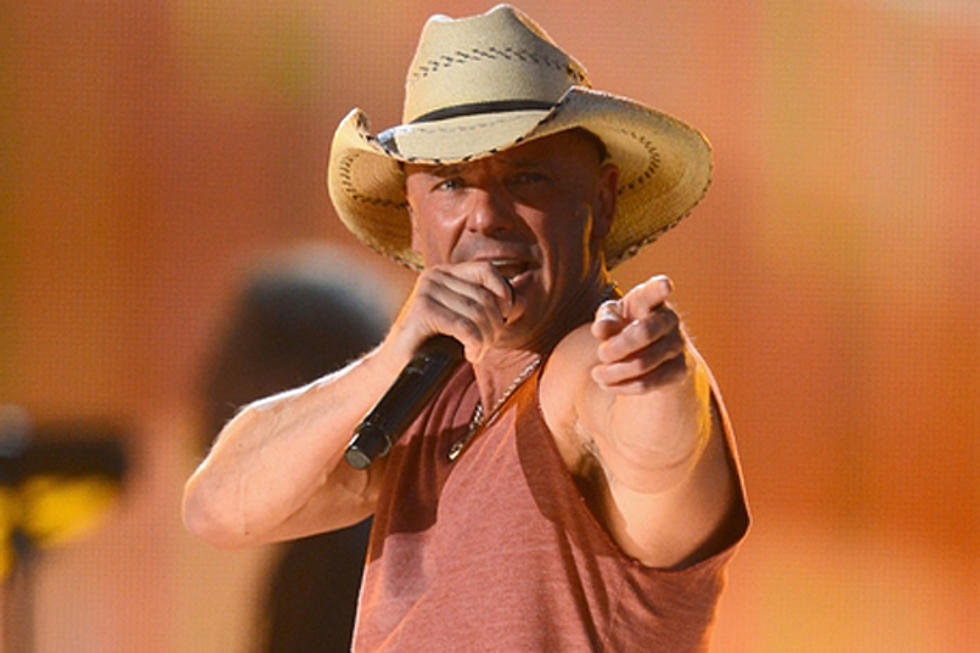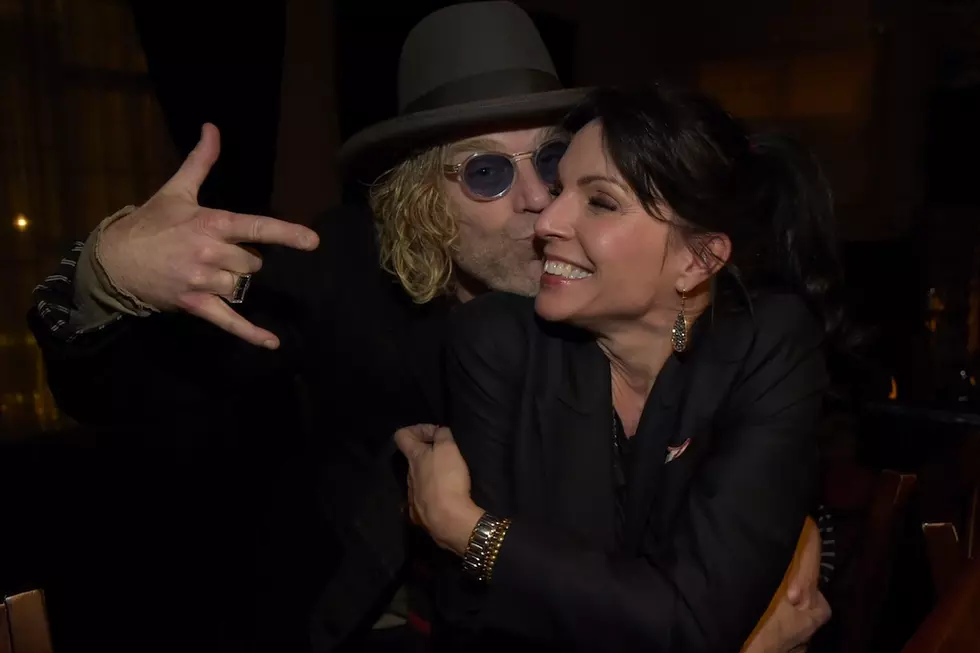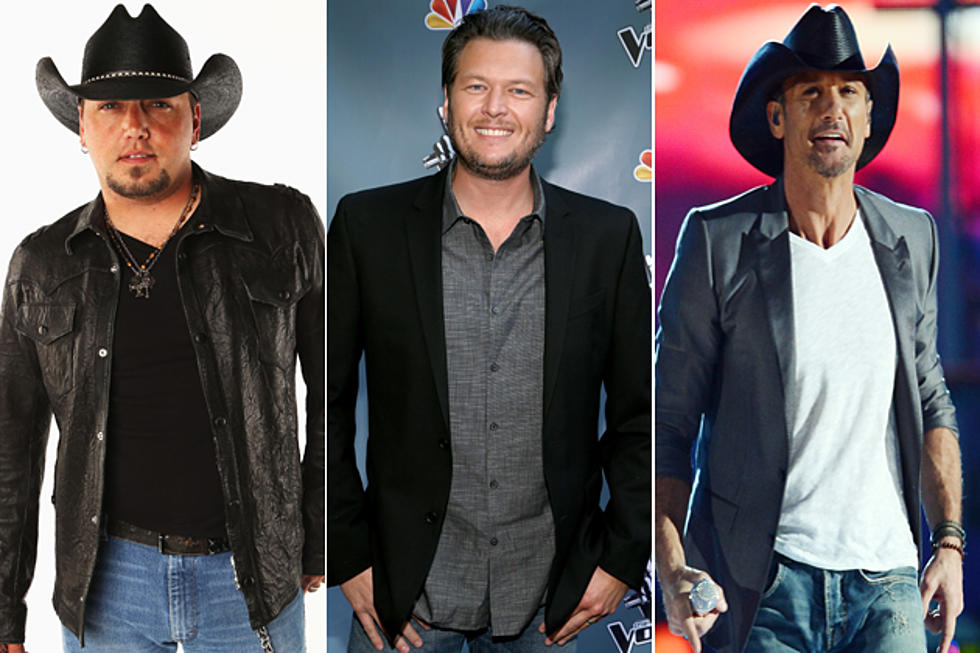
The Farm Songs Are Organically Grown (Exclusive Interview)
The members of The Farm had never even met when a mutual friend suggested they get together to write several years ago, and the common ground they found on that fateful, sunny day ended up being the perfect place for the seeds of some heartfelt, pure country music to take root. Starting out with a catchy fiddle hook, they each shared the love they felt for the places they called home, and instantly came up with their debut single, "Home Sweet Home." Realizing they were onto something, the three continued writing and found their particular blend of experiences, vocal styles and training yielded something unique. Damien Horne, Krista Marie and Nick Hoffman had each forged their own paths individually initially, but found strength in numbers and a newfound excitement and passion for their craft when singing together – and thus, the Farm was born. A bumper crop of fun, fresh tunes featuring their homegrown harmonies was released earlier this year, and the words of their new single, "Be Grateful," definitely hit home for the three, who have toiled long and hard to reach this point in their careers. The Boot chatted with the trio recently about their initial hesitation in forming the group, their undeniable work ethic, and the fiddle that's so key to their sound it's essentially a fourth member of the group.
Each of you came to the Farm with solo experience. What strengths do you feel you each bring to the table that make the group so unique?
Damien: We all brought a hard work ethic to the table. Nick was on the road with Kenny Chesney for 12 years, and to keep a secure gig like that you've got to have a strong work ethic. And the same with Krista. She had a solo deal and understands what it's like to be out on those long radio tours with long days and short nights and getting up and doing the same thing again and again. I'm the same way, having been an indie artist for a long time with that hustle mentality of having to work hard for every little bit you get. So to me, the work ethic is one of the coolest things about this group. I've been in positions before where you feel like you're carrying somebody else's weight, but with this that's not the case. If anything, you feel like you've got to make sure you step it up, because these guys are bringing it every day.
Krista: We all three bring something very different musically. When you watch us up onstage, you've got three separate entities up there working as one, but we're doing our own thing up there.
Nick: We all want this dream ... it's our dream individually and collectively, and we all want it so bad. All of our energies our whole lives have been pointed at this moment. When you look at the three of us you'd think, "Oh those guys were just slapped together. They manufactured the beautiful supermodel girl, the multiracial guy, the all-American spiky-haired boy ..." But the truth is we got together writing songs. It's organic. It started with the songs and as we started writing, we found ironically enough that our three voices fit together in a way you can't manufacture.
Your individual experiences seemed to help ready you for the success you're having now. But you weren't crazy about the idea of being in a group at first, were you?
Krista: I wouldn't have been ready for the group back then. Having the successes and failures I had in the music business set me up for this. All the things I did along the way, my journey out in California doing stunt work, and everything I did has led me to be able to be a part of this group. The hardest part, and what people don't realize unless you're living it, is being on a tour bus and being with each other every single day -- you have to be a professional. You have to bring your game and realize what this is about, and I don't believe a year or two prior that I would've been ready for this.
Nick: Each one of us has been in town 10-plus years. We have a level of maturity, musically and professionally, that came from those years. Each one of us moved to town to be solo acts, and I think our egos may have even gotten in the way 10 years ago. I'll be the first one to say, when we first started talking about being a group, I didn't want to be part of a group.
Damien: None of us did! In fact, when we went in and cut our first tracks, like "Home Sweet Home," that was really the experiment ... We knew we were heading in that direction, but we each one of us had our own hesitation for different reasons.
Krista: We were open to it, because things were lining up for us without us having to try. We'd been bashing our heads against the wall, and you're just trying to get through and trying to trudge forward, and with this it felt like we've had a little bit of wind at our backs.
Nick: And that wind at your back is the proof that it's right. This thing, everything fell into place exactly the way it was supposed to, and we didn't fight it. That's why it worked, because we just went with it and when we felt like fighting it, one of us would say, "Hold on, just bear with me here." We all just met each other in different ways and let it flow, and we do that musically onstage -- we've adopted that "let it flow" kind of policy.
How instrumental was your producer Danny Myrick in bringing all of you together and creating the Farm's sound?
Damien: To me, Danny has always been like the glue in this whole thing. He helped bring everything down to a level and rein it in, because you're still dealing with three lead singers individually and you have this fourth person who is kind of the mediator. You can bounce the ideas off of him and see what he thinks, and he's like the tiebreaker too. He's the peacemaker, and he brings a great level of talent to the project.
You signed with the first label you played for, Warner Music Nashville. How did you know that was the right home for you?
Nick: We went to them because we knew it was a little outside the box ... We had already recorded a bunch of stuff on our own, and we already had broken the mold even in the way we were recording. We were camping out almost rock band style and recording and not even doing it for a deal – we were just making music. So we played it for them and they liked it. We wanted to be with somebody who gets what we're doing and wasn't trying to change us.
You each have interesting backgrounds that led you here. Damien, tell us about your start with Big Kenny and the Muzik Mafia.
Damien: The Mafia was a fun time for me creatively, and it definitely prepared me for this because Mafia was about music without prejudice. You had all types of music and all different musicians who love music, and at the end of the day it was just about let's just make good music. It wasn't about fitting into a box or getting that deal, just let's create music we love to share with people. It opened up my eyes to a lot more music too, and if that wouldn't have happened I would not have been in the Farm. I grew up in a very sheltered sort of typical black home where you listened to R&B and gospel, but I became exposed to rock and country and blues and all this other music during that time.
If the things that happened to me early on didn't happen, I wouldn't be anywhere remotely where I am today because what I saw growing up was either prison or death. Those were kind of your options, so when somebody comes along and is able to show you something different and you're able to take that option and see a big old world from what you've seen before, that's a powerful thing. So I want to be able to do that for other people. Ultimately, what I want to do is reach people and try to make some type of mark on the world for the better. The thing that's been the coolest for me during the process is the stuff it's afforded me to be able to do, like go on a mission trip with Big Kenny to the Sudan and be part of things like that where I'm able to give back.
Krista, your background is in pageants, motocross and even doing movie stunt work before the Farm. Tell us about that.
Krista: I entered a pageant for the scholarship program. My dad passed away of cancer when I was 14, and when I became Miss Buffalo in New York, I became an advocate for colon cancer. That pageant money put me through college. I always wanted to be onstage and in front of the camera. I was very heavy into 4-H growing up, riding horses in hunter jumper and dressage. Then I flipped over to barrel racing, and next thing you know I needed something faster, so I worked at Six Flags all summer singing in the country show and secretly went out and bought a motorcycle. Later on I worked at a transmission shop, and one of the guys couldn't run his stock car one day and wanted to keep it in the points, so I drove it and finished top 10. And the next year I ran my own car and then raced motorcycles. I had a pretty bad motorcycle accident five years ago though, and the doctor who saved my life actually attended our album party. I don't race anymore, but I still have my dirt bike, and ATV and two motorcycles and ride anytime I can.
Nick, you actually ended up in Kenny Chesney's band by way of Branson before landing in the Farm. How did all of that transpire?
Nick: I grew up playing in a musical family and learned to play fiddle from my grandfather who taught me, and I play by ear. I took a trip to Branson with my grandparents, and saw all these people singing and playing, and it opened my eyes and I knew that's what I wanted to do. And I started getting antsy. I've always been a really driven person and wanted to start my career, and I felt like sitting in school I was spinning my wheels, it wasn't helping me get on the radio. So literally one night I had $60 in my pocket and packed up some clothes and grabbed my guitar and fiddle and got on a Greyhound bus and got off in Springfield, MO. In Branson, I met a guy who ended up playing with Kenny, so when I moved to Nashville I looked him up. He said, "It's funny you called me, we just fired our fiddle player!" He asked me to come fill in, and 12 years later I was still with him. So I would never have ended up with Kenny if I hadn't run away from home!
What did you learn from watching him all those years on the road?
Nick: Kenny has been really supportive of me doing my own thing. I was fortunate enough to be with him when everybody was still on one bus. My first Kenny gig was at Cowboys in Atlanta for 500 people, and I've watched how he operates and he's the hardest working guy in country music. It showed me that nothing comes easy, and anything worth having is worth working for. He's been an incredible mentor -- I've learned a lot from him. Kenny was never willing to compromise. When he felt strongly about something, he went after it. And in this case, because we're all so driven and sure of ourselves and who we are musically and professionally and personally, we weren't willing to compromise either. And that's also something that I learned from him that I take with me. We all just want to be the best we can be.
"Home Sweet Home" really showcases your trademark harmonies. It was the first song you wrote together, so did it help create your signature sound?
Nick: Just about every song we wrote between "Home Sweet Home" and the record coming out we ended up cutting. We were definitely on a roll. Whenever we got together to write, we were just hitting on all cylinders. And the biggest thing about it is we weren't forcing anything.
Damien: Musically, that song is the stamp of our sound – the fiddle and the three part harmony, and even though it was the first song we ever wrote it was like, "That's our sound – that is us!" That's the foundation we kind of built from.
Nick: I grew up singing bluegrass and old time country music.
Krista: And I love harmony! I'll harmonize with anything!
Damien: Yeah, that's how I am too. You grow up in church, that's all you do!
Nick: So what ended up happening is we organically fell into a trio stack that is very bluegrass oriented. Even the notes we pick and the harmonies we sing, it ended up being very bluegrass-esque. It's what works for us vocally. But if you listen to us individually, I'm the only guy with any kind of bluegrass tone in his voice. These two don't have any.
Krista: On paper it doesn't seem like it would even work! It just does somehow.
Nick: The Eagles, if you listen to Joe Walsh by himself and Don Henley by himself and Timothy B Schmit by himself, those are three distinctly different singers who are night and day, black and white different. But for some reason, they blend in a way that is magical. And that's one of the coolest things about the Farm, and it's one of the reasons we all love being a part of it. We're one of those groups that if you took one of us out, it wouldn't be the same. It's a three-legged stool, and the sound would change so drastically if you took one of us out of it that it wouldn't work. We all bring something to the table that is integral and I think that is special.
Watch The Farm's 'Home Sweet Home' Video
More From TheBoot








![Catch Big Kenny in Monster’s Super Bowl LII Commercial [WATCH]](http://townsquare.media/site/623/files/2018/02/monster-super-bowl-2018-ad-big-kenny.png?w=980&q=75)
